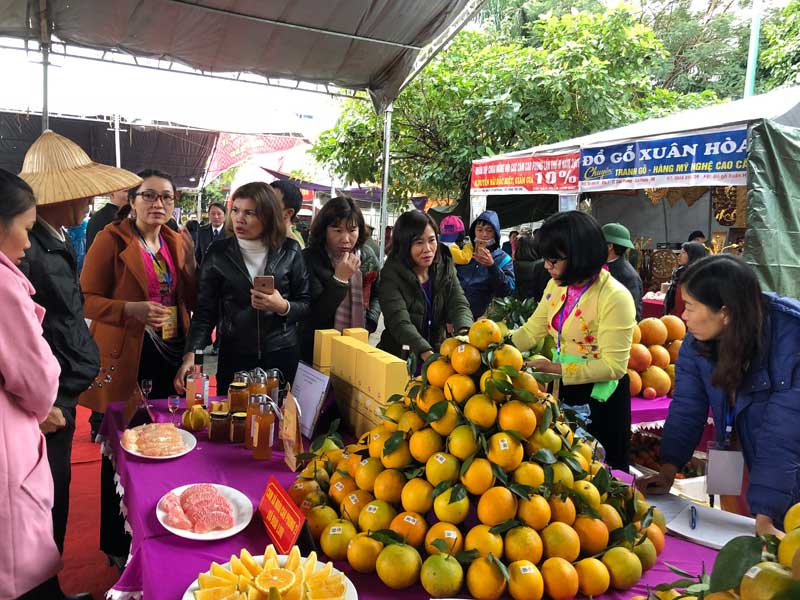
(HBO) – A citrus fruit festival and agricultural fair took place in mid-December in the northern province of Hoa Binh as part of the activities to promote local citrus fruits.
In recent
years, the area of citrus fruits in the province has increased to 9,700
hectares in 2018 from 1,976 hectares in 2013, yielding 123,000 tonnes.
The fruits are mainly grown in nine out of the
11 districts and city, including oranges in Cao Phong, Lac Thuy, Kim Boi and
Lac Son districts, and grapefruits in Tan Lac and Yen Thuy districts. In Cao
Phong alone, the area of citrus fruits covers over 3,000 hectares, including
1,300 ha ready for harvest with an estimated output of 36,000 tonnes, up 3,000
tonnes against 2017. Lac Thuy district has 1,045 hectares of these fruits,
including 400 hectares ready for harvest, yielding over 8,000 tonnes.

Cao Phong
oranges promoted at the citrus fruit festival and agricultural fair win trust
of customers thanks to its clear label of origin.
To protect the brand of citrus fruits, the local
agriculture and rural development sector has applied a number of measures in
recent years, including the control of the quality of varieties. Unscheduled and
periodical inspections are carried out annually to prevent low-quality
agricultural supplies, especially fake fertiliser and unsafe seedlings from
entering the local market.
The provincial plantation and plant protection division
said it has conducted inspections over 500 establishments trading agricultural
supplies on the use of pesticides, production procedures, and breeding sales.
They found no violation.
Since 2015, the province has successfully built
geographical indicators for Cao Phong, Lac Thuy orange and Tan Lac red-flesh
grapefruit. To protect the brand of the fruits, local gardeners have applied
science technology into production, meeting requirements on fruit hygiene and
safety. In Cao Phong district, about 800 hectares of oranges were certified
with Vietnamese Good Agricultural Practices (VietGAP), labelled with trace of
origin and packaged to prevent counterfeit products. Meanwhile, in Tan Lac
district, some 52 hectares of red-flesh grapefruits received VietGAP
certification./.
Since the beginning of this year, under the direction of the Department of Agriculture and Environment, the Sub-Department of Agricultural, Forestry, and Fishery Product Quality Management has strengthened the integration of the professional activities to promote and guide the organizations and individuals in the production and trading of agricultural, forestry, and fishery products to comply with the legal regulations regarding the use of chemicals, pesticides and veterinary medicines in crop cultivation, livestock farming and aquaculture. They also provide guidance to processing and manufacturing establishments on keeping the records to trace the product origins and using food additives from the approved list according to the regulations.
Hoa Binh province saw a significant rise in state budget revenue in the first two months of 2025, heard a meeting chaired by Vice Chairman of the provincial People’s Committee Quach Tat Liem.
Ha Thi Ha Chi, a 26-year-old graduate in law, has taken an unconventional path by returning to her hometown in Mai Chau district to establish the Tong Dau Cooperative, creating stable jobs for local women and bringing Thai ethnic brocade weaving to the global market.
As the Lunar New Year 2025 approached, pork prices surged, creating a profitable season for farmers in Tan Vinh commune, Luong Son district. Taking advantage of the rising demand, Can Minh Son, a farmer from Coi hamlet, sold over 30 pigs at 69,000 VND/kg, each weighing more than 100 kg. After deducting expenses, his family earned a profit of over 50 million VND.
alternate member of the Central Party Committee, Secretary of the Hoa Binh provincial Party Committee Nguyen Phi Long on March 5 had a working session with Yan Jiehe, Founder and Chairman of the China Pacific Construction Group, one of China's largest private corporations in the field of transport infrastructure. Deputy Secretary of the provincial Party Committee, Chairman of the provincial People's Committee Bui Duc Hinh and leaders of provincial departments and sectors also attended the working session.
The electronic printed circuit board (PCB) manufacturing and processing plant of Japan’s Meiko Group, located at Da River Left Bank Industrial Park in Hoa Binh city with a total investment of over 200 million USD, is expected to create thousands of jobs and make a significant contribution to the local budget.



